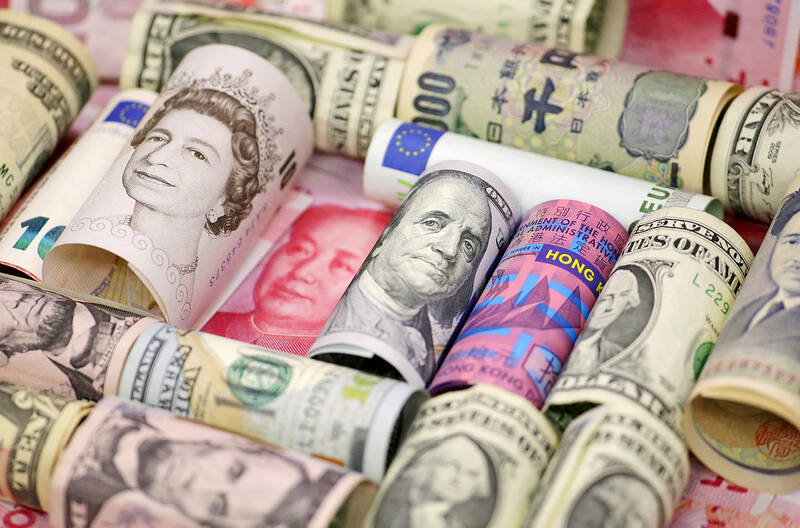Taiwan’s foreign exchange reserves last month fell by US$1.06 billion to US$569.54 billion from the previous month, ending two straight months of sequential gains, as the US dollar rose and eroded the value of other reserve currencies, the central bank said yesterday.
In addition, the central bank intervened in the local market last month to shore up the local currency, which weighed on overall foreign exchange reserves, Department of Foreign Exchange Director-General Eugene Tsai (蔡炯民) said during a news conference in Taipei.
It is not uncommon for the central bank to step in when it sees it necessary to slow excessive fund flows and stabilize the foreign exchange market, Tsai said.

Photo: Reuters
Global funds late last month bought greenback-denominated assets on the expectation that the US Federal Reserve would keep interest rates at high levels, rather than start to lower interest rates as early as next month, Tsai said.
As a result, the US dollar index grew 1.94 percent, while the Japanese yen lost 4.23 percent, the Chinese yuan weakened 1.24 percent and the New Taiwan dollar softened 1.64 percent, he said.
The market is now looking at the Fed’s interest rate cuts beginning in May at the earliest, Tsai said.
The view gained force after recent US GDP and employment data turned out stronger than expected and Fed Chairman Jerome Powell last week called for patience with high interest rates following a rate-setting Federal Open Market Committee meeting, he said.
Though the Financial Supervisory Commission saw fund inflows of more than US$3 billion to the local bourse last month, marking the third consecutive month of net fund inflows, the central bank observed foreign funds wiring profits of a similar size abroad, suggesting a balance in supply and demand, Tsai said.
Tsai linked the foreign fund outflow to a cash dividend distribution on the part of Taiwan Semiconductor Manufacturing Co (台積電), the world’s largest contract chipmaker.
Foreign portfolio managers repeatedly cut and raised holdings in local shares last month and so far this month, in keeping with their ever-changing views on the Fed’s policy intentions, he said.
Despite the retreat in foreign exchange reserves last month, Taiwan holds the world’s fourth-largest foreign exchange reserves after China, Japan and Switzerland, Tsai said.
The central bank would maintain ample foreign exchange reserves to ensure stability in local financial markets and guard against any sudden fund outflows by foreign investors, he added.

TAKING STOCK: A Taiwanese cookware firm in Vietnam urged customers to assess inventory or place orders early so shipments can reach the US while tariffs are paused Taiwanese businesses in Vietnam are exploring alternatives after the White House imposed a 46 percent import duty on Vietnamese goods, following US President Donald Trump’s announcement of “reciprocal” tariffs on the US’ trading partners. Lo Shih-liang (羅世良), chairman of Brico Industry Co (裕茂工業), a Taiwanese company that manufactures cast iron cookware and stove components in Vietnam, said that more than 40 percent of his business was tied to the US market, describing the constant US policy shifts as an emotional roller coaster. “I work during the day and stay up all night watching the news. I’ve been following US news until 3am

UNCERTAINTY: Innolux activated a stringent supply chain management mechanism, as it did during the COVID-19 pandemic, to ensure optimal inventory levels for customers Flat-panel display makers AUO Corp (友達) and Innolux Corp (群創) yesterday said that about 12 to 20 percent of their display business is at risk of potential US tariffs and that they would relocate production or shipment destinations to mitigate the levies’ effects. US tariffs would have a direct impact of US$200 million on AUO’s revenue, company chairman Paul Peng (彭雙浪) told reporters on the sidelines of the Touch Taiwan trade show in Taipei yesterday. That would make up about 12 percent of the company’s overall revenue. To cope with the tariff uncertainty, AUO plans to allocate its production to manufacturing facilities in

Six years ago, LVMH’s billionaire CEO Bernard Arnault and US President Donald Trump cut the blue ribbon on a factory in rural Texas that would make designer handbags for Louis Vuitton, one of the world’s best-known luxury brands. However, since the high-profile opening, the factory has faced a host of problems limiting production, 11 former Louis Vuitton employees said. The site has consistently ranked among the worst-performing for Louis Vuitton globally, “significantly” underperforming other facilities, said three former Louis Vuitton workers and a senior industry source, who cited internal rankings shared with staff. The plant’s problems — which have not

COLLABORATION: Given Taiwan’s key position in global supply chains, the US firm is discussing strategies with local partners and clients to deal with global uncertainties Advanced Micro Devices Inc (AMD) yesterday said it is meeting with local ecosystem partners, including Taiwan Semiconductor Manufacturing Co (TSMC, 台積電), to discuss strategies, including long-term manufacturing, to navigate uncertainties such as US tariffs, as Taiwan occupies an important position in global supply chains. AMD chief executive officer Lisa Su (蘇姿丰) told reporters that Taiwan is an important part of the chip designer’s ecosystem and she is discussing with partners and customers in Taiwan to forge strong collaborations on different areas during this critical period. AMD has just become the first artificial-intelligence (AI) server chip customer of TSMC to utilize its advanced